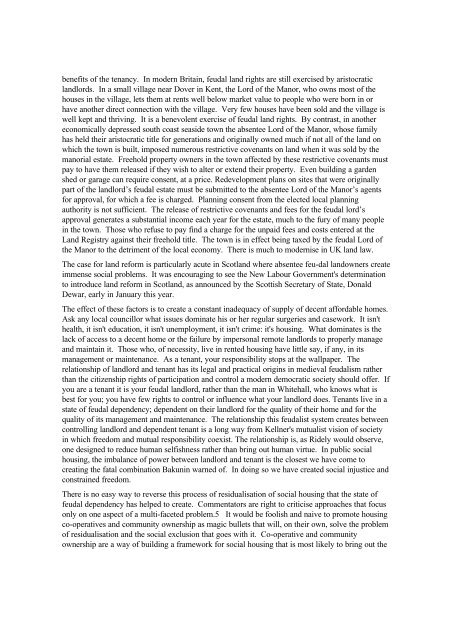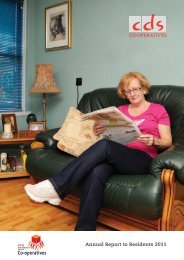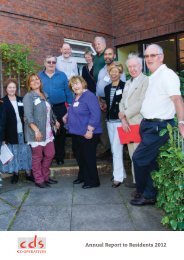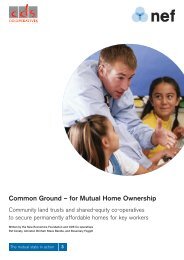New Mutualism - The Third Estate - CDS Co-operatives
New Mutualism - The Third Estate - CDS Co-operatives
New Mutualism - The Third Estate - CDS Co-operatives
- No tags were found...
Create successful ePaper yourself
Turn your PDF publications into a flip-book with our unique Google optimized e-Paper software.
enefits of the tenancy. In modern Britain, feudal land rights are still exercised by aristocratic<br />
landlords. In a small village near Dover in Kent, the Lord of the Manor, who owns most of the<br />
houses in the village, lets them at rents well below market value to people who were born in or<br />
have another direct connection with the village. Very few houses have been sold and the village is<br />
well kept and thriving. It is a benevolent exercise of feudal land rights. By contrast, in another<br />
economically depressed south coast seaside town the absentee Lord of the Manor, whose family<br />
has held their aristocratic title for generations and originally owned much if not all of the land on<br />
which the town is built, imposed numerous restrictive covenants on land when it was sold by the<br />
manorial estate. Freehold property owners in the town affected by these restrictive covenants must<br />
pay to have them released if they wish to alter or extend their property. Even building a garden<br />
shed or garage can require consent, at a price. Redevelopment plans on sites that were originally<br />
part of the landlord’s feudal estate must be submitted to the absentee Lord of the Manor’s agents<br />
for approval, for which a fee is charged. Planning consent from the elected local planning<br />
authority is not sufficient. <strong>The</strong> release of restrictive covenants and fees for the feudal lord’s<br />
approval generates a substantial income each year for the estate, much to the fury of many people<br />
in the town. Those who refuse to pay find a charge for the unpaid fees and costs entered at the<br />
Land Registry against their freehold title. <strong>The</strong> town is in effect being taxed by the feudal Lord of<br />
the Manor to the detriment of the local economy. <strong>The</strong>re is much to modernise in UK land law.<br />
<strong>The</strong> case for land reform is particularly acute in Scotland where absentee feu-dal landowners create<br />
immense social problems. It was encouraging to see the <strong>New</strong> Labour Government's determination<br />
to introduce land reform in Scotland, as announced by the Scottish Secretary of State, Donald<br />
Dewar, early in January this year.<br />
<strong>The</strong> effect of these factors is to create a constant inadequacy of supply of decent affordable homes.<br />
Ask any local councillor what issues dominate his or her regular surgeries and casework. It isn't<br />
health, it isn't education, it isn't unemployment, it isn't crime: it's housing. What dominates is the<br />
lack of access to a decent home or the failure by impersonal remote landlords to properly manage<br />
and maintain it. Those who, of necessity, live in rented housing have little say, if any, in its<br />
management or maintenance. As a tenant, your responsibility stops at the wallpaper. <strong>The</strong><br />
relationship of landlord and tenant has its legal and practical origins in medieval feudalism rather<br />
than the citizenship rights of participation and control a modern democratic society should offer. If<br />
you are a tenant it is your feudal landlord, rather than the man in Whitehall, who knows what is<br />
best for you; you have few rights to control or influence what your landlord does. Tenants live in a<br />
state of feudal dependency; dependent on their landlord for the quality of their home and for the<br />
quality of its management and maintenance. <strong>The</strong> relationship this feudalist system creates between<br />
controlling landlord and dependent tenant is a long way from Kellner's mutualist vision of society<br />
in which freedom and mutual responsibility coexist. <strong>The</strong> relationship is, as Ridely would observe,<br />
one designed to reduce human selfishness rather than bring out human virtue. In public social<br />
housing, the imbalance of power between landlord and tenant is the closest we have come to<br />
creating the fatal combination Bakunin warned of. In doing so we have created social injustice and<br />
constrained freedom.<br />
<strong>The</strong>re is no easy way to reverse this process of residualisation of social housing that the state of<br />
feudal dependency has helped to create. <strong>Co</strong>mmentators are right to criticise approaches that focus<br />
only on one aspect of a multi-faceted problem.5 It would be foolish and naive to promote housing<br />
co-<strong>operatives</strong> and community ownership as magic bullets that will, on their own, solve the problem<br />
of residualisation and the social exclusion that goes with it. <strong>Co</strong>-operative and community<br />
ownership are a way of building a framework for social housing that is most likely to bring out the







